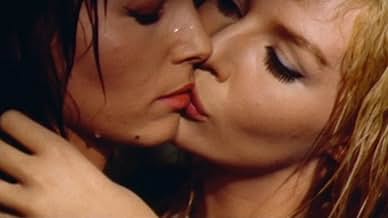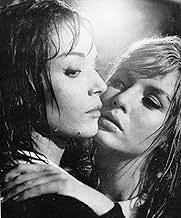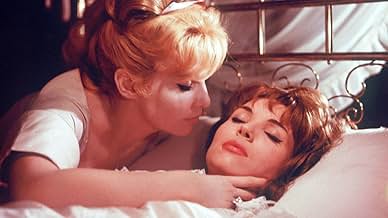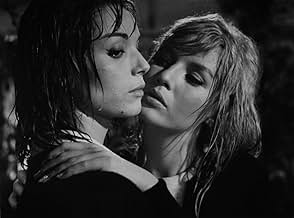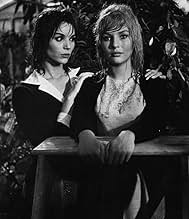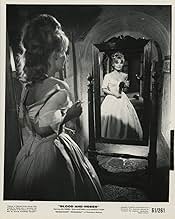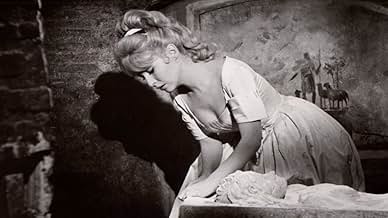IMDb RATING
6.5/10
1.6K
YOUR RATING
A young heiress - jealous of her cousin's engagement to another woman - becomes obsessed with the legend of a vampire ancestor, who supposedly murdered the young brides of the man she loved.A young heiress - jealous of her cousin's engagement to another woman - becomes obsessed with the legend of a vampire ancestor, who supposedly murdered the young brides of the man she loved.A young heiress - jealous of her cousin's engagement to another woman - becomes obsessed with the legend of a vampire ancestor, who supposedly murdered the young brides of the man she loved.
Annette Stroyberg
- Carmilla
- (as Annette Vadim)
René-Jean Chauffard
- Dr. Verari
- (as R.J. Chauffard)
Gabriella Farinon
- Lisa
- (as Gaby Farinon)
Edith Peters
- The Cook
- (as Edith Arlene Peters Catalano)
Nathalie Lafaurie
- Marie
- (as Nathalie LaFaurie)
Carmilla Stroyberg
- Martha
- (as Camilla Stroyberg)
Giovanni Di Benedetto
- Police Marshal
- (uncredited)
Renato Speziali
- Guido Naldi
- (uncredited)
Roger Vadim
- Passenger in the Plane
- (uncredited)
Featured reviews
An art house horror movie. Probably missed by horror fans, the film depicts a vampiress as romantic. The music by Jean Prodromidès and the cinematography by Claude Renoir certainly add to the romantic feeling throughout. A Harlequin horror film? Even the long shots in this film have a grace seldom seen. It often looks as if one is viewing and Impressionistic painting.
Carmilla (Annette Vadim) visits an abbey where the vampiress is buried and we see an immediate change in her mood. Was she possessed? It isn't clear.
Don't look for blood and guts or lesbian scenes. Everything happens off screen, even in the original version. But, it was a beautiful love story.
Carmilla (Annette Vadim) visits an abbey where the vampiress is buried and we see an immediate change in her mood. Was she possessed? It isn't clear.
Don't look for blood and guts or lesbian scenes. Everything happens off screen, even in the original version. But, it was a beautiful love story.
I'm mad about this film...might just be my favorite vampire film of all. It's not straight LeFanu, but it has an elegiac air that is. Doing LeFanu 'straight'--as in VAMPIRE LOVERS-- does not necessarily make for a better film as Hammer proved.
When I first saw B&R 15 years ago, I was disappointed because I wanted it to be a direct telling of the source material. Later, I saw the film, again, and it seared in to my consciousness. For no explicable reason, it suddenly "made sense" and "glammed" me; and, in particular, Annette Stroyberg's performance suddenly "clicked in." The combination of her detachment, passivity, out bursts of passion, child-like felicity, and, of course, beauty recall her literary namesake. Her profound sorrow and knowledge of being pushed aside from all that she loves--not just Leopoldo but her whole life, really--is heart-rending.
Vadim's Carmilla is always described as "jealous" or "bitter," though I don't see that. I do see deep disappointment and despair. It's refreshing, too, to see two women, rivals for one man's affection, treat each other so civilly, so kindly. Worse, Carmilla is slowly ostracized from people that she has grown up with and loved all because of her love of Leopoldo and, then, Georgia. Top that off with being possessed by a vampire, and I think dismissing her as "jealous" or "bitter" is a bit heavy-handed and easy.
I'm not quite sure why this film is considered "exploitive"--was Vadim "exploiting" Annette and his divorce from BB? Was LeFanu's "Carmilla" exploitive? It actually had far more explicit descriptions of Carmilla's breast-centric vampirism of young woman, but I don't recall the novella ever being described as "exploitive."
There are a couple of jarring moments in the film that don't sit right with me, for instance, Carmilla and Leopold doing the comic piano duet about fishing, and some parts of the celebrated "dream sequence"--just too "art house," even Bergman-esquire, and certainly screaming Cocteau.
But, in the end, the film is enchanting, ravishing, and harrowing. As others have noted, the score is exquisite and sets just the right tone, and makes me think of "pavane" and "dead princess" at the same time. Definitely in my top 10.
Just hoping that the delay in releasing BLOOD AND ROSES on DVD has to do with a pains- taking restoration and accumulation of extras on Paramount's part--this film is long overdue on DVD.
When I first saw B&R 15 years ago, I was disappointed because I wanted it to be a direct telling of the source material. Later, I saw the film, again, and it seared in to my consciousness. For no explicable reason, it suddenly "made sense" and "glammed" me; and, in particular, Annette Stroyberg's performance suddenly "clicked in." The combination of her detachment, passivity, out bursts of passion, child-like felicity, and, of course, beauty recall her literary namesake. Her profound sorrow and knowledge of being pushed aside from all that she loves--not just Leopoldo but her whole life, really--is heart-rending.
Vadim's Carmilla is always described as "jealous" or "bitter," though I don't see that. I do see deep disappointment and despair. It's refreshing, too, to see two women, rivals for one man's affection, treat each other so civilly, so kindly. Worse, Carmilla is slowly ostracized from people that she has grown up with and loved all because of her love of Leopoldo and, then, Georgia. Top that off with being possessed by a vampire, and I think dismissing her as "jealous" or "bitter" is a bit heavy-handed and easy.
I'm not quite sure why this film is considered "exploitive"--was Vadim "exploiting" Annette and his divorce from BB? Was LeFanu's "Carmilla" exploitive? It actually had far more explicit descriptions of Carmilla's breast-centric vampirism of young woman, but I don't recall the novella ever being described as "exploitive."
There are a couple of jarring moments in the film that don't sit right with me, for instance, Carmilla and Leopold doing the comic piano duet about fishing, and some parts of the celebrated "dream sequence"--just too "art house," even Bergman-esquire, and certainly screaming Cocteau.
But, in the end, the film is enchanting, ravishing, and harrowing. As others have noted, the score is exquisite and sets just the right tone, and makes me think of "pavane" and "dead princess" at the same time. Definitely in my top 10.
Just hoping that the delay in releasing BLOOD AND ROSES on DVD has to do with a pains- taking restoration and accumulation of extras on Paramount's part--this film is long overdue on DVD.
I recently had the opportunity to see the French version of this film ("And Die of Pleasure")and propose two things of note: firstly, the controversy over the omission of the dream sequence- regarding the official running time of 84 minutes, I believe it was actually included in the French version but this print was either damaged or censored, the cutting is way too abrupt and the scene rendered senseless. If the scene was included in the French version then the running time would match official sources. Excellent source materials such as Silver & Ursini's The Vampire Film seem to back this up. The other point of interest that no one has noted so far is perhaps even more controversial. Although there is a brief nude scene included in the dream sequence, there is one nude scene in the French version clipped out of the American prints- before Annette Vadim breaks the mirror she tears her dress away and reveals her blood smeared breast. Yes, we DO see it! This ten years before Yutte Stensgaard's bloody topless resurrection in Lust for a Vampire!
I saw Vadim's "Blood and Roses" in Germany while stationed there in the 1960's. I was captivated by its ethereal, romantic quality. The actresses were beautiful and the mixture of romance and vampires was unusual and hauntingly lovely. In my view, it is a classic. I particularly loved the musical score, which was outstanding. I cannot seem to find this musical score other than by ordering the VHS video.
I am particularly disappointed that I cannot find this film in DVD today, since I would like to have it in my library.
I thought that Mel Ferrar was perfect for his role since he was seemingly oblivious as one might expect a country gentleman to be to what was going on with the girls.
The film reveals a poignant story of unrequited love, with a fatalistic tone. It will be long remembered by those who have seen it. It does not get the popularity that it deserves.
I am particularly disappointed that I cannot find this film in DVD today, since I would like to have it in my library.
I thought that Mel Ferrar was perfect for his role since he was seemingly oblivious as one might expect a country gentleman to be to what was going on with the girls.
The film reveals a poignant story of unrequited love, with a fatalistic tone. It will be long remembered by those who have seen it. It does not get the popularity that it deserves.
This film has three outstanding features: The spectacular location, Hadrian's Villa, Claude Renoir's ravishing color and b&w cinematography, and an exquisite score featuring the rarely-used Irish harp. Vadim's direction fails to make the most of these elements, or the story, alas, but Annette Stroyberg and Elsa Martinelli are both interesting. It's above average for Vadim.
I don't know where the other poster got the idea that Stroyberg's first name was Carmilla. She did sometimes go by her married name, Vadim.
I don't know where the other poster got the idea that Stroyberg's first name was Carmilla. She did sometimes go by her married name, Vadim.
Did you know
- TriviaChristopher Lee was originally considered for the role of Count Karnestein (probably to make the film marketable for fans of his Hammer vampire films) but the part eventually went to his friend Mel Ferrer.
- GoofsIn three shots from the same scene, the bloodstain on Carmilla's dress moves from the right to the left side, then back to the right side again.
- Alternate versionsThe US version of the film eliminates both the original epilogue and prologue as the Professor tells the story of Carmilla, as well as almost every scene with Martha and Marie. That version also includes a totally different ending on which Georgia herself becomes a vampire, as well as an all new voice over narration by Millarca herself.
- ConnectionsFeatured in Aweful Movies with Deadly Earnest: Blood and Roses (1975)
- How long is Blood and Roses?Powered by Alexa
Details
- Runtime
- 1h 14m(74 min)
- Aspect ratio
- 2.35 : 1
Contribute to this page
Suggest an edit or add missing content

